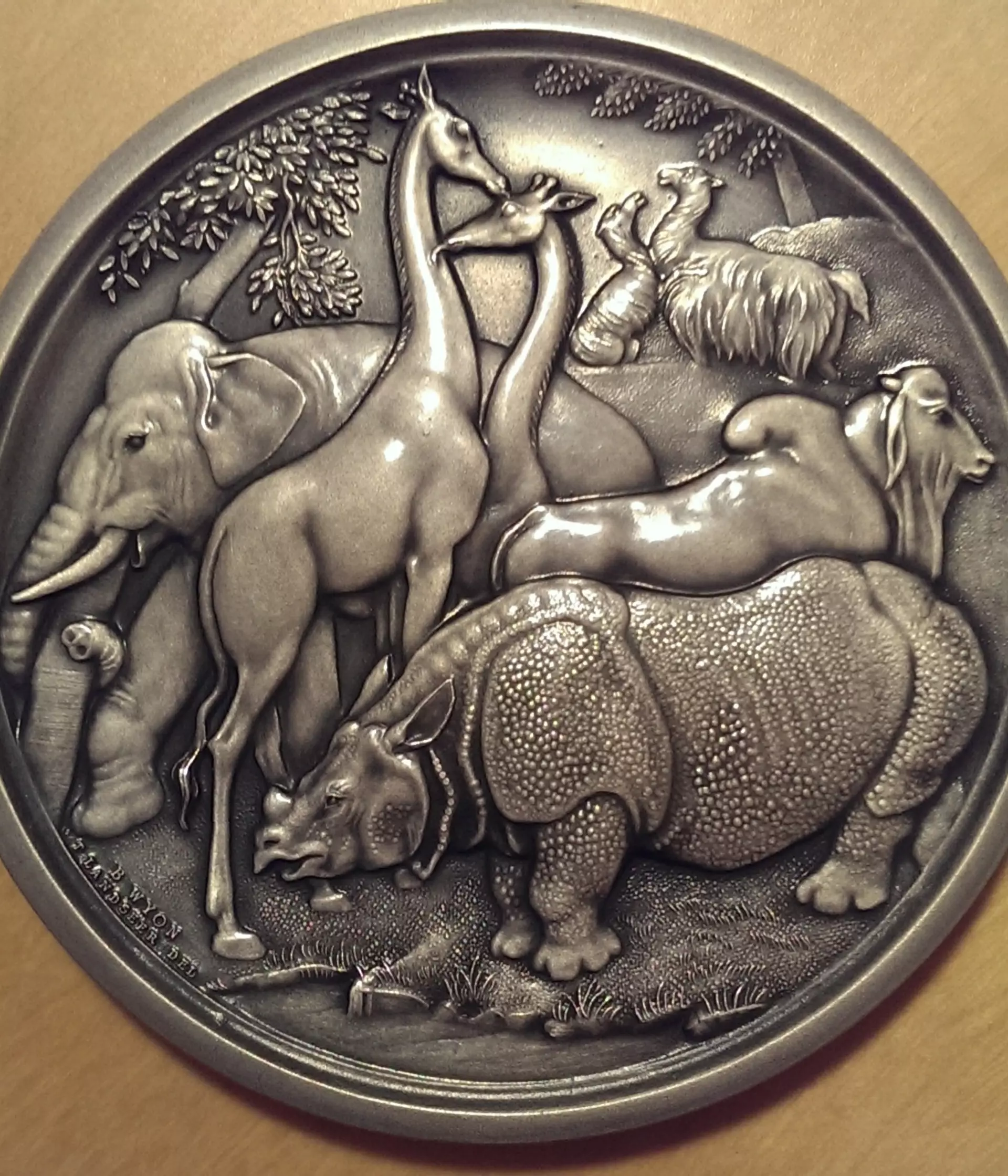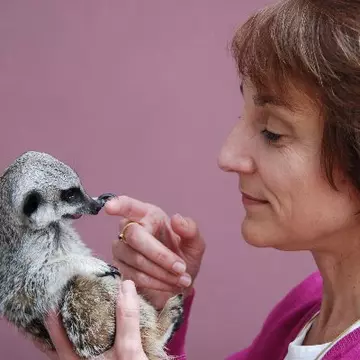
ZSL
Zoological Society of London
Every year, ZSL recognises outstanding achievement in zoology and conservation science through a programme of prestigious awards.
The contributions of this year's distinguished winners span a variety of topics across conservation and science. Find out more about their achievements below.
ZSL Frink Award for Outstanding Contributions to Zoology

The Frink Award is ZSL’s premier scientific award, and this year it is presented to Professor Jane Hurst, University of Liverpool. Jane has made outstanding achievements in both zoological research and the wider application of her research to science and society. Jane is a leader in field of chemical communication in mammals, focussing on the role of diverse chemical cues in social learning and recognition in rodents.
Jane’s research on major urinary proteins in rodents has been transformative to the field. Much of her activity has been in ensuring that the right techniques are used to accurately assess animal behaviour, establishing innovative techniques to study animal behaviour in both natural populations and under carefully controlled naturalistic conditions, using transponder tags and video, mass-spectrometry and genomics. As a world expert on rodent behaviour and an exceptionally rigorous experimental zoologist, Jane has been an incredibly effective advocate for animal welfare and better animal experiments, leading to significant improvements in animal research far outside Jane’s own field. Jane’s diverse contributions to animal welfare are also evidenced in being a founding board member for NC3Rs and by numerous prestigious awards, most notably an OBE in the 2020 New Year’s Honours list for services to animal welfare. We are delighted to present Jane with this Society’s Frink Award.
ZSL Prince Philip Award and Marsh Prize

The ZSL Prince Philip Award and Marsh Prize is awarded for the best A-Level or Higher project submitted by a school in the UK. This year’s award is presented to Eva Black, Colchester County High School for Girls, for her project 'Are Eurasian blue tits more attracted to UV fluorescent feeders or non-fluorescent feeders and do they show a preference between orange and red?'
In this outstanding project, Eva investigated whether the colour and UV fluorescence of bird feeders had an effect on the frequency of visits that Eurasian blue tits make to the feeders, and whether the birds could distinguish between similar shades of the same colour. Ingeniously, Eva crocheted different covers for the bird feeder and then used timelapse video to record the number of visits to each feeder. The results showed that blue tits were significantly more attracted to the UV fluorescent feeders than its non-fluorescent equivalent. The project is extremely well written, and includes a mature discussion of the results, alongside recommendations for future research.
ZSL Thomas Henry Huxley Award and Marsh Prize

The ZSL Thomas Henry Huxley Award and Marsh Prize is awarded for the best PhD thesis submitted by a university in the UK. This year’s award is presented to Dr Rodrigo Oyanedel, University of Oxford, for his thesis ‘Tackling small scale fisheries non-compliance'.
In this outstanding thesis, Rodrigo advances the scientific understanding of how non-compliance in the context of small-scale wildlife use can be studied and managed. Focusing on a small-scale fishery in Chile as a case study, Rodrigo used diverse and specialised techniques for assessing non-compliant behaviours, finding that most of the common hake traded in the region comes from non-compliant activities. Moreover, Rodrigo found that non-compliance in the fishery was highly influenced by the operation of the supply chain and market dynamics. Rodrigo provided key policy recommendations to reduce the extent of non-compliant behaviours in the small-scale fishery case study and beyond. He also developed tools and frameworks to study non-compliance in other wildlife trade contexts. This exceptional thesis highlights the value of integrated research the social and economic complexity of non-compliance, and the diverse actions needed to it.
ZSL Scientific Medal is awarded for outstanding contributions by an early career researcher. Awarded to:
Professor Kathryn Elmer, University of Glasgow
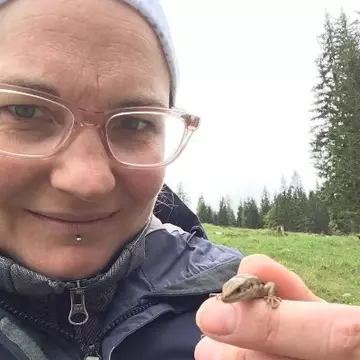
Kathryn carries out innovative research on the genomic mechanisms underlying adaptive evolutionary change. Kathryn excels in bringing together evidence from different biological levels to challenge traditional evolutionary thinking. For example, in an early application of whole genome sequencing to Nicaraguan crater lake cichlid fishes, Kathryn demonstrated how different genetic histories can underly highly convergent, adaptive phenotypes. Her research has brought together phenotypic, ecological, and genetic evidence to show that non-parallel evolutionary histories can result in significantly convergent/parallel outcomes. Kathryn has applied this innovative approach to study parallelism in Holarctic fish and to demonstrate that adaptive divergence can be very rapid.
More recently, Kathryn has used her ability to combine multiple lines of evidence from past and present populations to answer important evolutionary questions, such as the genetic basis of viviparity and oviparity in vertebrates.
Dr Stephanie King, University of Bristol

Stephanie is an outstanding scientist specialising in the behaviour and ecology of social interactions in dolphins. Her research has yielded profound insights into the evolution of sociality and cognition, and advanced our understanding of communication, cooperation and cognition in the natural world. Stephanie’s early research focused on “signature whistles” that dolphins use to announce their presence. Through detailed behavioural observations and hydrophone recordings, Stephanie demonstrated how dolphins acquire their signature calls by copying and modifying the calls of close associates, and using innovative playback experiments, she was able to show how dolphins use these learned calls to address one another. These results led to groundbreaking research into the role of communication in cooperation, showing how vocal exchanges allow male dolphins to maintain social bonds.
Further high-impact work has revealed the cognitive demands of dolphin cooperation, including the ability to recognise when cooperative partners are needed, providing important evidence for the argument that social challenges can drive cognitive evolution.
Dr Matthew Struebig, University of Kent

Matthew is an outstanding scientist who has made major contributions to our understanding of the impacts of land-use change on biodiversity in South-east Asia. In early work, Matthew used genetic approaches to understand the impacts of habitat fragmentation on bats in Malaysia. His research on habitat fragmentation and the impacts of palm oil continued, with Matthew leading an international network to model the distributions of Borneo’s mammal species, both present day and under different climate and land-use change scenarios, to identify priority areas for their conservation.
Matthew’s research is co-produced with conservation practitioners, governments and the oil palm industry, in order to help develop policy and practice that informs conservation action on the ground. In this way Matthew has demonstrated the value of forest set-asides in oil palm plantation for tropical mammals and birds in Malaysia, and the importance of width and forest quality in riparian buffers. This research is leading to policy change in the state of Sabah and informed recent updates to certification criteria for the Roundtable for Sustainable Palm Oil.
ZSL Silver Medal
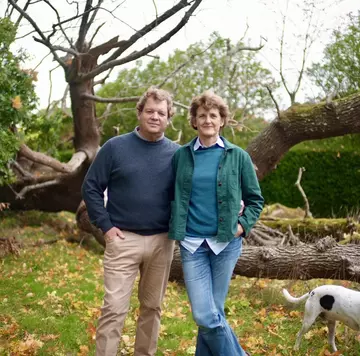
The ZSL Silver Medal is awarded for contributions to the understanding and appreciation of zoology, including public education in natural history, and wildlife conservation. This year, the award is presented to Isabella Tree and Charles Burrell. Isabella and Charlie have led what has become the UK’s most famous re-wilding project at Knepp in West Sussex. They are true pioneers of the re-wilding movement. Knepp was the first large-scale rewilding project in lowland England and has inspired many other re-wildling initiatives across the country, both large and small. The Knepp story is chronicled in Tree’s book Wilding – the Return of Nature to a British Farm, which was shortlisted for the Wainwright prize in 2019 and winner of the 2018 Richard Jefferies Society Literature Award. The Knepp project is remarkable in that it shows just how fast nature can recover if given the space.
As well as habitat restoration, Knepp is also a farming project, with grazing ecology key to its success. The Knepp project has led to numerous learnings that have knock-on benefits to other conservation initiatives for native British nature, many of them associated with non-intensive farming techniques that are less harmful to nature. The successes for wildlife are well-documented, and are across the animal, plant and fungi kingdoms; for example, Knepp is a now breeding haven for Red-Listed nightingales and turtle doves, and it is the centre of a re-introduction programme for white storks, which has seen this iconic species breed in England for the first time since the early 1400s.
Marsh Award for Conservation Biology

The ZSL Marsh Award for Conservation Biology is awarded for fundamental science that has significant impact on conservation biology. This year’s winner is Professor John Gittleman, University of Georgia. John has contributed foundationally to integrating macroecology and macroevolution into modern conservation biology. John’s publications on carnivore ecology and conservation, including the edited two‐volume series on Carnivore Behavior, Ecology, and Evolution, remain pillars in the field. His work on phylogenetic comparative methods and analyses of IUCN Red List classifications demonstrated how contemporary extinction risks could be used to generate predictive models, allowing the identification of species with traits that might predispose them to high risk of extinction, but which are not yet threatened.
John’s research has made major contributions to our understanding of rates of species loss, how the spatial distribution of species richness, endemism and threat are not always congruent, and on links between biodiversity and the increasing emergence of infectious disease. Importantly, John’s research also provides a message of hope, showing how investment in conservation can help stem the tide of biodiversity loss.
Marsh Award for Marine and Freshwater Conservation

The ZSL Marsh Award for Marine and Freshwater Conservation is awarded for fundamental research which has had significant impact on marine and freshwater conservation. This year’s award is presented to Dr Hollie Booth, University of Oxford. Hollie seeks to solve one of the greatest challenges of the 21st century – that of meeting humanity’s increasing demand for natural resources while conserving threatened species and respecting and supporting the rights and priorities of local people. While the scientific community can identify solutions needed to halt biodiversity loss, Hollie is addressing the next great challenge – the “implementation gap" of applying science effectively on the ground to create change.
Her focal issue is fisheries bycatch, specifically of sharks and rays in Indonesia. Hollie has identified the social and individual barriers to bycatch mitigation for fishers, highlighting the need to understand complex social factors when addressing the problem. Hollie has demonstrated that levies on bycatch and conservation payments can be implemented to compensate fishers for going out of their way to safely return endangered fishes to the ocean. The trademark of Hollie’s research is that she implements her findings in a way that allows her to evaluate their effectiveness, and in doing so, she has made impactful contributions to national and international policy.
ZSL Clarivate Award
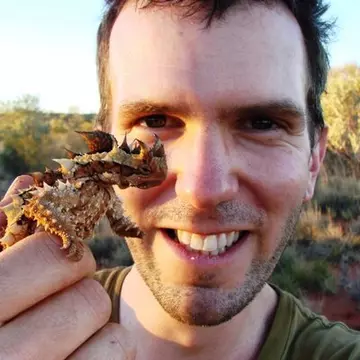
The ZSL Clarivate Award for Communicating Zoology is warded for a communication of a zoological nature that has an outstanding impact on a general audience. The impact may be measured in terms of outstanding quality, novelty, innovation or accessibility for a wide audience. This year's award is presented to Jack Ashby for his book Platypus Matters. In this remarkable book, Jack explores the traditional narrative about Australia’s native animals and shows how it is incorrect. Jack uses his favourite animal, the platypus, as ambassador to describe the diversity of Australia’s mammals – highlighting that Australia is the only place on Earth where you can find all three ways of being a mammal: monotremes, marsupials and placentals. Jack asserts that Australian’s mammals are viewed ‘fondly, but not fairly’, and that traditional narratives of these animals in museums and on TV continues to devalue Australian wildlife – with very real consequences for their conservation.
Platypus Matters is a call to action to address the urgency of the current extinction crisis and Jack’s exploration into colonial perspectives, and how they have shaped attitudes to Australia’s fauna to this day, is powerful and important.
We are grateful to our sponsors, the Marsh Charitable Trust and Clarivate, for generously supporting ZSL's awards programme.
